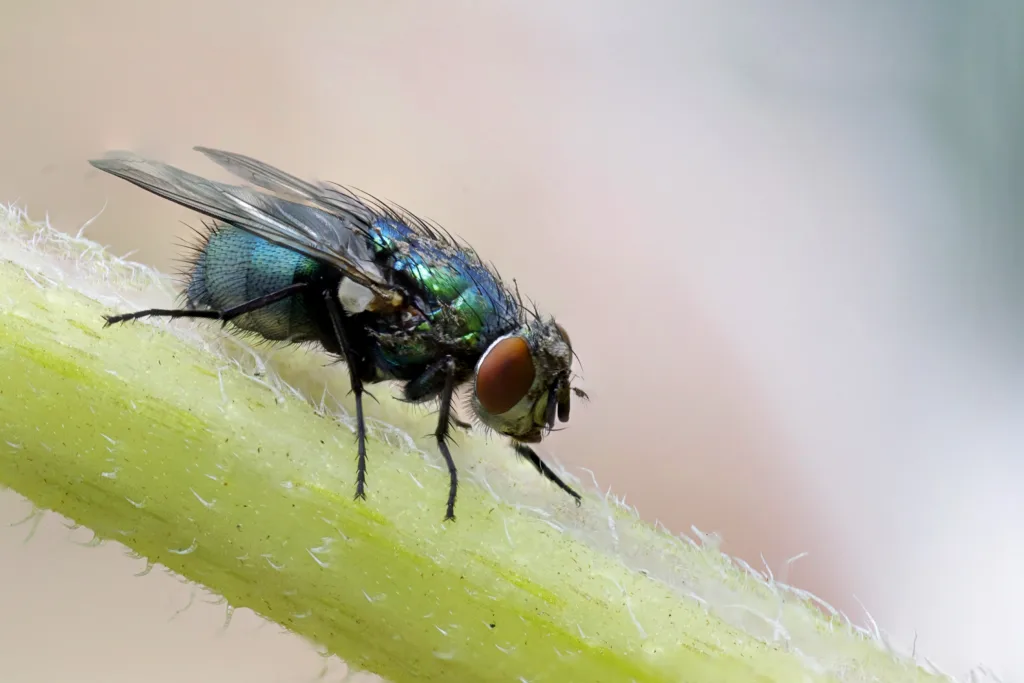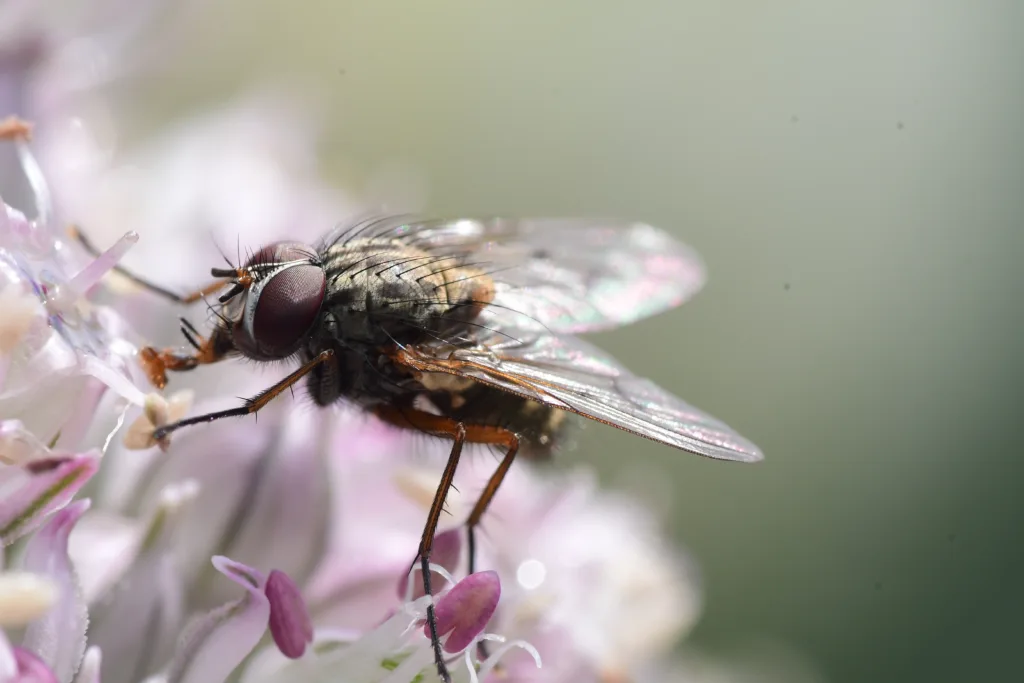Flies are some of the most common pests that we encounter in our daily lives. They are present everywhere, from our homes to our workplaces, and they can be a nuisance to deal with. One of the most important questions that people often ask about flies is how long they can survive without food. In this article, we will explore the answer to this question in detail.
Flies are insects that belong to the order Diptera. There are over 160,000 species of flies, and they are found in alost every part of the world. The most common types of flies that people encounter in their homes are house flies, fruit flies, and drain flies. These flies are attracted to food, water, and other organic matter, and they can quickly become a nuisance if not controlled.
The lifespan of a fly depends on various factors, including temperature, humidity, and access to food and water. The average lifespan of a housefly is around 15 to 30 days, but it can vary depending on the environmental conditions. Flies that live in warm homes or laboratories may develop faster and live longer than their counterparts in the wild. However, regardless of their location, flies will eventually die if they do not have access to food and water.
Flies can only survive without food for two to three days. Access to water and other suitable nutrients may prolong this, but generally speaking, if there is no sugar to lengthen their life, they will not have a suitable environment to infest. This means that if you want to get rid of flies in your home, you need to focus on eliminating their food sources. Clean up any spills or crumbs immediately, store food in airtight containers, and take out the trash regularly. These simple steps can go a long way in preventing flies from infesting your home.
Flies are common pests that can be a nuisance to deal with. The lifespan of a fly depends on various factors, including temperature, humidity, and access to food and water. Flies can only survive without food for two to three days, which means that eliminating their food sources is an effective way of getting rid of them. By following simple steps like cleaning up spills and storing food properly, you can prevent flies from infesting your home and enjoy a pest-free environment.
Lifespan of Flies Trapped in a Window
Flies, particularly houseflies, are commonly found in homes and offices, buzzing around, looking for food and breeding grounds. However, when they get trapped in a window, they can’t escape, leading to their eventual death.
The lifespan of a housefly is relatively short, ranging from 15 to 30 days. However, when they are trapped in a window, their lifespan can be even shorter. This is because they are unable to access food and water sources, which are necessary for their survival.
In addition, the air-conditioned environment of the building can also contribute to their death. Flies are cold-blooded insects, and when they are exposed to low temperatures for an extended period, their metabolism slows down, leading to their eventual demise.
The period a fly can survive trapped in a window depends on several factors, including the temperature, humidity, and availability of food and water. However, on average, a housefly trapped in a window will last for abot two weeks before dying.
Flies trapped in a window will eventually die due to the lack of food, water, and exposure to low temperatures. The maximum duration they can survive is around two weeks, depending on various environmental factors.

The Lifespan of a Fly in the Home
Houseflies are a common nuisance in many households, and it’s natural to wonder how long they will stick around. The lifespan of a housefly varies depending on several factors, including temperature and living conditions.
On average, a housefly can live for 15 to 30 days. However, this lifespan can be affected by environmental conditions. For instance, flies living in warmer homes and laboratories tend to develop faster and live longer than those living in the wild.
Houseflies go through a complete metamorphosis, which includes four stages: egg, larva, pupa, and adult. The eggs hatch within a day or two, and the larvae will then feed on decaying organic matter for several days before entering the pupal stage. The pupal stage lasts for a few days before the adult fly emerges.
It’s important to note that houseflies can multiply quickly if left uncontrolled. Female houseflies can lay up to 500 eggs in their lifetime, which means that a small fly infestation can quickly turn into a larger problem.
To prevent houseflies from taking over your home, it’s crucial to practice good sanitation habits. Some tips include:
– Keeping food covered and stored properly
– Regularly cleaning up spills and crumbs
– Taking out the garbage frequently
– Keeping doors and windows screened
– Using fly traps or repellents as needed
By taking tese steps, you can help reduce the lifespan of houseflies in your home and keep the population under control.
Do Flies Have a 24-Hour Lifespan?
There is a common belief that all flies die within 24 hours, but this is not entirely true. While it may be the case for some species of flies, such as mayflies, which have a very short lifespan, it is not true for most of the common flies that people encounter in their homes or outdoors.
House flies, for instance, can live for several weeks, and even up to a few months, depending on the conditions they are in. Similarly, fruit flies, which are another common type of fly, can also live for a few weeks, and even up to a month in some cases.
It is important to note that the lifespan of a fly depends on factors such as its species, habitat, and environmental conditions. Flies that are exposed to extreme temperatures, lack of food or water, or other adverse conditions may not survive for very long.
While some species of flies may have a lifespan of only 24 hours, it is not true for most of the common flies that people encounter, such as house flies and fruit flies. These types of flies can live for several weeks or even months under the right conditions.
The Impact of Food Deprivation on Flies
Flies are common insects that can be found in homes, offices, and other environments. They can survive for up to a month undr certain conditions, but their survival depends on access to food and other suitable nutrients. Without food, flies can only live for two to three days. This means that if there is no source of sugar or other nutrients to sustain them, they will not be able to survive for very long.
It is important to note that access to water and other suitable nutrients may prolong a fly’s life. However, in the absence of food, their lifespan will be significantly shortened. Flies require food for energy and to maintain their bodily functions. They typically feed on sugary substances and other organic matter, such as decaying food or animal waste.
A fly will die without food within two to three days. While access to water and other nutrients may prolong their lifespan, flies require food to survive and maintain their bodily functions.

Conclusion
Flies have a relatively short lifespan that varies based on their living conditions and environment. While house flies can live for up to a month, they can only survive without food for two to three days. Their ability to multiply quickly can become a nuisance if left uncontrolled. It is important to take measures to prevent flies from infesting your home, such as keeping your living space clean and free of food waste. By understanding the lifespan and habits of flies, we can better protect ourselves and our homes from these pesky insects.
